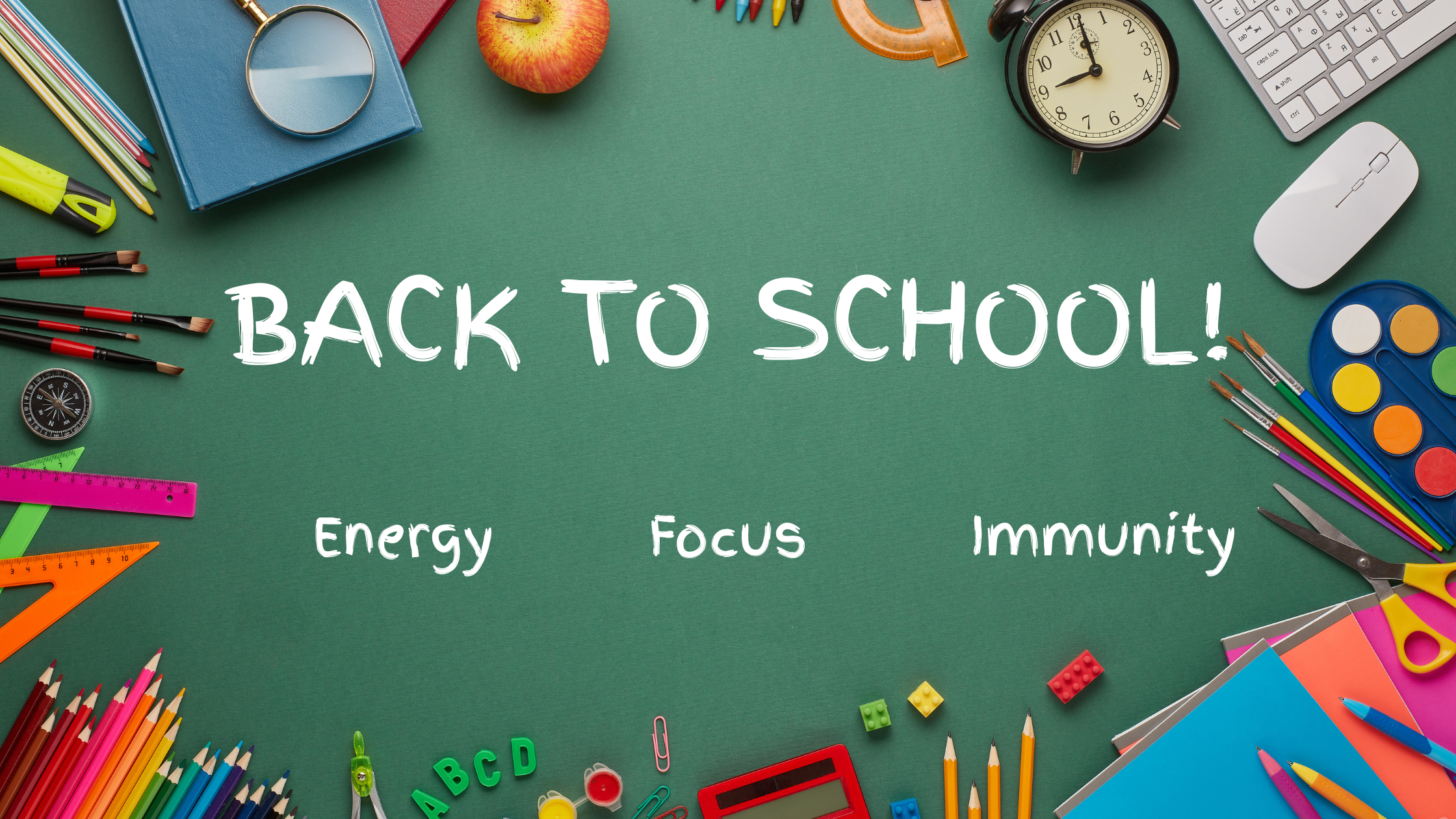
Back to School Boost: All The Ways To Improve Focus, Energy And Immunity
As the summer holidays wrap up and the school bells begin to ring again, there’s a certain excitement in the air—new books, new shoes, new routines, and new opportunities to learn and grow. But let’s face it: switching from lazy mornings and carefree afternoons to structured days packed with lessons, homework, and extracurriculars can be quite the shock to the system. Children, particularly teens, may struggle with maintaining focus in the classroom, staying energised throughout the day, and fending off those all-too-common sniffles that sweep through schools.
The good news? A few simple changes can work wonders for your child’s concentration, vitality, and immune defences. Whether it's the right foods, smarter sleep routines, or nutritional support, getting your child back into peak learning mode doesn’t have to be overwhelming. In fact, it can be fun, empowering, and a great opportunity to build long-term healthy habits. So, let’s dive into all the science-backed ways you can help your child step into the new term energised, sharp, and resilient.
10 Science-Backed Tips To Improve Energy, Fous and Immunity
1. Start the Day with a Balanced Breakfast
Breakfast truly is the most important meal of the day—especially for school-age children and teens. A balanced breakfast fuels the brain and body, improving memory, attention span, and overall cognitive function.
Research shows that children who eat a healthy breakfast show improved academic performance, concentration, and problem-solving abilities compared to those who skip it. Ideal breakfasts combine complex carbohydrates, protein, and healthy fats—think oats with nut butter, eggs on whole grain toast, or Greek yoghurt with fruit and seeds.

2. Prioritise Quality Sleep
Sleep is the foundation of cognitive function and immune strength. School-age children need 9–11 hours, while teens need 8–10 hours of quality sleep each night. Lack of rest can lead to poor concentration, irritability, low energy, and weakened immunity.
Establish a consistent bedtime routine—lights out at the same time, screens off at least an hour before, and calming activities like reading or a warm bath. Sleep helps consolidate learning and restores mental and physical energy for the next day.
3. Encourage Regular Physical Activity
Movement is not just for physical health—it’s a fantastic way to improve mood, focus, and brain performance. Exercise increases oxygen flow to the brain and boosts the release of endorphins and brain-derived neurotrophic factor (BDNF), which enhances memory and learning.
Just 30 minutes of moderate activity—like walking, cycling, or dancing—can improve attention and cognitive flexibility in children.
4. Keep Them Hydrated
Dehydration—even mild—can impact concentration, memory, and mood. Children often forget to drink water during busy school days, which can lead to headaches, fatigue, and slower cognitive responses.
Make water fun by packing a reusable bottle, infusing it with fruits, or creating hydration challenges. Encourage 6–8 cups of water a day, more if it’s hot or if your child is physically active.
5. Reduce Screen Time Before Bed
Screens emit blue light, which interferes with melatonin production—the hormone responsible for regulating sleep. Too much screen time before bed can delay sleep onset and reduce sleep quality, leading to daytime drowsiness and poor focus.
Establish tech-free time at least one hour before bedtime and encourage wind-down activities like journaling or reading to promote restful sleep and better school performance.

6. Support Gut Health with Probiotics
A healthy gut is closely linked to immunity and even brain function. The gut-brain axis—a communication system between the gut and brain—is influenced by the balance of good bacteria in the digestive system.
Probiotics support this balance and may enhance mood, cognition, and immune resilience. Yoghurt, kefir, and fermented foods are great options, or consider a probiotic supplement if dietary intake is low.
7. Incorporate Brain-Boosting Nutrients
Certain nutrients are essential for focus and mental clarity:
- Omega-3 fatty acids (from fish, walnuts, flaxseed) improve attention and cognitive development.
- Iron supports oxygen transport to the brain.
- Zinc and magnesium help with memory and mood regulation.
- B vitamins are crucial for energy metabolism.
Ensure meals include a wide variety of whole foods—lean protein, leafy greens, nuts, seeds, and colourful fruits and vegetables.
8. Build Immunity with Antioxidant-Rich Foods
Foods rich in vitamin C, vitamin A, and zinc help strengthen the immune system. Citrus fruits, berries, carrots, and pumpkin are great choices.
Antioxidants protect the body from free radicals and reduce inflammation, which is crucial during the school season when kids are exposed to multiple pathogens.
9. Promote Mindfulness and Stress Management
School can be overwhelming—exams, social pressures, and after-school responsibilities take a toll. Teaching kids how to manage stress can greatly improve their mental clarity and overall well-being.
Research shows that mindfulness practices such as breathing exercises, meditation, or simply being present during tasks have been shown to improve attention span and reduce anxiety in students.

10. Use a Quality Multivitamin Supplement
Despite the best intentions, children—especially teens—often have gaps in their diet. That’s where a high-quality multivitamin can help. Multivitamins provide essential nutrients that support energy metabolism, cognitive function, and immune health.
Try Teen Multi Chewable For Her and Teen Multi Chewable For Him by Route2Health! These specially formulated chewables are packed with key vitamins and minerals tailored to meet the unique needs of growing adolescents. From iron for oxygen transport to B-complex vitamins for energy and immune support, they’re a tasty and convenient way to fill in any nutritional gaps.
Add them to your child’s morning routine to help boost brainpower, stay energised throughout the school day, and support strong immunity all year long.
Conclusion
Back-to-school season is the perfect time to reset routines and prioritise health. By supporting your child’s nutrition, sleep, movement, and mental wellness, you can set the stage for a successful academic year. These ten science-backed strategies are easy to implement and can make a huge difference in your child’s focus, energy, and resilience—both inside and outside the classroom. Whether it’s a better breakfast, regular exercise, or a daily multivitamin from Route2Health, small steps now can lead to lifelong habits of wellness.
Let this school year be the one where your child doesn’t just survive—but thrives.
FAQs
1. What foods help improve focus in children?
Foods rich in omega-3 fatty acids (like salmon and flaxseeds), protein (like eggs and lentils), and complex carbohydrates (like oats) support brain health and improve concentration.
2. How much sleep does a school-age child need?
Children aged 6–13 need about 9–11 hours of sleep per night, while teenagers require 8–10 hours for optimal cognitive and physical health.
3. How can I boost my child’s immunity before school starts?
Focus on a nutrient-dense diet, regular physical activity, good sleep hygiene, hydration, and consider adding a multivitamin like Teen Multi by Route2Health.
4. Do multivitamins really help with energy and immunity?
Yes, when dietary intake is insufficient, multivitamins can fill nutritional gaps, support energy metabolism, and strengthen immune defences.
5. What is the best routine for school mornings?
Start with a wholesome breakfast, a glass of water, a multivitamin, and light physical activity or mindfulness to set a positive tone for the day.
























































